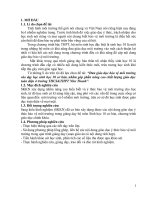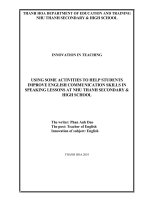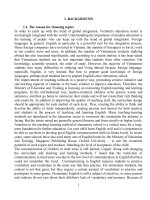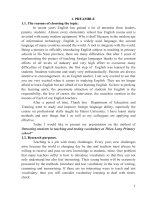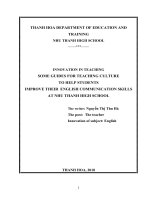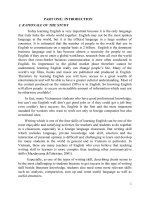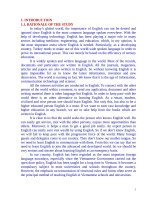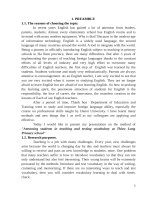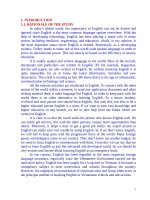Using some activities to help students improve english communication skills in speaking lessons at nhu thanh secondary and high school
Bạn đang xem bản rút gọn của tài liệu. Xem và tải ngay bản đầy đủ của tài liệu tại đây (983.37 KB, 23 trang )
THANH HOA DEPARTMENT OF EDUCATION AND TRAINING
NHU THANH SECONDARY & HIGH SCHOOL
INNOVATION IN TEACHING
USING SOME ACTIVITIES TO HELP STUDENTS
IMPROVE ENGLISH COMMUNICATION SKILLS IN
SPEAKING LESSONS AT NHU THANH SECONDARY &
HIGH SCHOOL
The writer: Phan Anh Dao
The post: Teacher of English
Innovation of subject: English
THANH HOA 2018
1
TABLE OF CONTENT
1: INTRODUCTION
1.1. Rationale of the study
1.2. Aims of the study
1.3. Object of the study
1.4. Methods of the study
2 : CONTENT
2.1. Theoretical and practical basis
2.1.1. Theoretical basis:
2.1.2. Practical basis:
2.2. The status of the research subject:
2.2.1. The advantages of teaching speaking skill:
2.2.2. The disadvantages of teaching speaking skill:
2.3. Some solutions to the research subject:
2.3.1. General requirements:
2.3.2. The main solutions:
2.3.3. Organization steps:
2.3.4. Demonstration:
2.4. Result.
3: CONCLUSION AND SUGGESTION
3.1. Conclusion:
3.2. Suggestion:
4: REFERENCE BOOKS
PAGE
2
2
3
3
3
3
3
3
4
4
4
4
5
5
6
8
9
19
20
20
20
21
2
1 : INTRODUCTION
1.1. RATIONALE OF THE STUDY:
Knowing English is knowing everything so English has now become one
of the most popular languages in the world . In the tendency of integration of the
global economy, English is one of the most effective communicative tools for
everybody. The role of English is considered to be very important in the fields of
economics, politics, science, culture and education. Being aware of the
importance of English so the society is becoming more and more interested in
teaching and learning English at schools, the curriculums and the methods of
teaching English are innovated to better the needs of learners.
Therefore, today in Viet nam, everyone from the children to the adult
tends to learn English and many English centers are opened to satisfy the
leaners. They are fully aware that knowing English will allow people to access
an incredible amount of information which may not be otherwise available. So
communication skills are essential for a successful career, satisfying relationships
and a personal sense of accomplishment. Communication is seen every day
through TV commercials, interaction with the person opening a door for people
and listening to the manangers of their company speaking. Effective
communication empowers people, provides clear direction and increases
productivity. Without it, people lose motivation and the inability to make a
decision, and they become angry because their messages are not understood.
In fact, many students in Viet nam who have good command of English, but
can’t use English well don’t get good jobs. So, English is the first and the most
important standard for workers who want to work not only at foreign companies
but also at national ones.
To do this better, Teachers at schools especially at high schools and
Universities have to use many skills and activities to promote positive,
proactive students and create optimal conditions for students to train, develop
and enhance skills to use language for purposes of communication. So we have
to create the environment for students to communicate in the classroom,
especially, in Speaking lessons and this raises for teachers is to organize various
activities to improve the efficiency of the speaking lessons and make students
feel easily with the subject. However, students have limited time to learn
English in class, and they still do not have enough encouragement to practice
English outside the class in order to get familiar with English. This case brings a
3
problem that make high school students have difficulties to communicate in
English and the majority of students are still feeling embarrassed and shy when
speaking in front of the class.
Therefore, in this study I boldly give the subject “ Using some activities
to help students improve English communication skills in speaking lessons at
Nhu Thanh secondary and High School ”
1.2. AIMS OF THE STUDY
When writing this initiative, I just wish to offer some ideas to find the best
teaching methods to generate excitement for students and bring optimal
efficiency.
- Through this research, I myself will have more experiences in teaching
speaking lessons.
- Promote active learning of students in English periods, especially in the
of speaking lessons
- guiding students to practise themseves, practise to have skills and
speaking skills in English.
1.3. OBJECT OF THE STUDY
This research is carried out in grade 10A1, 11C1, 12B1 and 12B4 at Nhu
Thanh Secondary & High School
1.4. METHODS OF THE STUDY
In this research, I use some research methods to collect and analyze the
needed data. Recording is used to record the process of giving some activities and
surveying through the answer sheets is used to know the practical situation of
teaching and learning English communication skills.
a. Observation method:
Reading reference books, summarizing material research and visiting
classes of colleagues.
b. Exchange method, discussion:
Discussing with other colleagues after visiting their classes to draw out
experiences.
c. Experimental method:
Teachers can carry out experimental teaching according to the aims of
specific request in speaking lessons
d. Survey method:
Teachers ask questions to test and evaluate the content of the students’
lessons.
2. CONTENT
4
2.1. Theoretical and practical basis
2.1.1. Theoretical basis:
The aim of teaching a foreign language is not only to give students the
knowledge of the language, but also the ultimate aim of teaching a foreign
language is to teach students to have the ability to communicate in that
language. The ability of students to communicate through skills: Listening,
Speaking, Reading and Writing. Students' speaking skills are formed through a
process of academic training in English language environment. In addition to
learning in the classroom, students have to learn and practice speaking through
different forms and methods
2.1.2. Practical basis:
After many years teaching English in high school , I have noticed the fact
that the majority of students in high school are afraid of learning English, and
they often have a heavy feeling in the English lessons and especially in
speaking lessons. So what must we do to make students have a real enthusiasm
about learning a foreign language, namely English subject and make students
look forward to and hope for this subject without feeling bored ? How can they
hear and speak simple English sentences in a natural way ? Those are some of
my concerns in the teaching process, so I'm always trying to find out the most
effective solutions to make my lectures attractive to students, and is also aimed
at improving the quality of this subject on the purpose of renovating teaching
methods is that : “learner –centered”.So I decide to choose this research subject.
2.2. The status of the research subject:
2.2.1. The advantages of teaching speaking lessons:
- For students:
Most students in Nhu Thanh secondary & high school have studied English
since they were in secondary school and the knowledge which they are provided
at this level of education is relatively high on grammar, vocabulary and
communication skills .
Most students are obedient and aware of studying.
Students themselves and their parents have realized the importance of
learning English so they have had the interest and considerable investment in
many aspects to this subject , and it is no longer considered a subordinate
subject.
Schools have been equipped with full conditions about facilities for study
like language laboratory, books, tapes, and radios
- For teachers:
5
Teachers have satisfied with the school’s demand as well as education and
applied the new teaching methods.
The facilities of the school like language laboratory , books , tapes , and
radios are full and Administrator is interested and facilitates the teaching of the
teachers so that they can prove their abilities in the best way.
2.2.2.The disadvantages of teaching speaking lesson:
- For students:
There are so many different students in class and the quality of each
student is uneven.
Many students haven’t determined the importance of English in the current
period, so they aren’t aware of their own learning.
Some students have a limited vocabulary so they can’t know how to speak
a correct sentence
Classrooms are crowded, and the activities of speaking lesson often
practise in pairs or in groups so the classrooms are easily noise.
- For teachers:
There are still some teachers who have difficulty in teaching speaking
skills and choosing suitable skills for each lesson.
Teachers don’t assign the tasks to students clearly.
Teachers don’t create the environment to encourage students to speak
English effectively.
2.2.3. Specific survey in classes 10A1, 11C1, 12B1 and 12B4
Class
Students
Excellent-good
Average
Weak (bad)
10A1
100%
10%
55%
35%
11C1
100%
8%
57%
35%
12B1
100%
9%
55%
36%
12B4
100%
9%
55%
36%
2.3. Some solutions to the research subject:
2.3.1. General requirements:
We know that speaking skill plays a very important role in mastering a
foreign language. According to David Nunan (1991) the author of language
teaching methodology book: "Success is measured by the ability to conduct a
dialogue in the language they are learning." To do this successfully, teachers must
make students understand and gain the ability to use the language as much as
possible because the needs of learners are very diverse. Besides, teachers
shouldn’t create unfortunate misunderstanding in the communication process.
6
Speaking skills of students are practised with other skills through a learning
process in English language environment. In addition to learning in classroom,
students must learn themselves and practise speaking exercises through different
forms and methods because the aim of speaking exercises is to help learners
speak exactly and fluently.
The selection of teaching speaking techniques must be determined on the
basis of the lesson content to build the activities for study.
Through research process and practice in different classrooms I offer some
solutions to guide students to develop communication skills.
2.3.2. The main solutions:
Students often think that the ability to speak a language is the product of
language learning, but speaking is also a crucial part of the language learning
process. To guide students to develop communication skills in English, teachers
can teach students speaking strategies such as providing a dialogue, spoken word
actions, using minimal respones, practising grammar structures and applying
groupwork or pairwork in speaking skills and games.
2.3.2.1: Providing a dialogue:
Thanks to the guidance of teachers, students themselves can create the
dialogues and then practice, practice instead. This activity is quite simple and
will be familiar so students are interested in learning.
The main purpose of this activity is to help students use Wh- questions or
Yes-no questions fluently
2.3.2.2: Spoken word actions:
In these actions teachers should let students speak simple sentences or
dialogues so that students have communicative opportunities .
In classroom, teachers can give some exercises to students to explain or talk on
the themes and afterwards, teachers and the whole class will remark by asking
questions or assessing and this will help students make faster progress because:
- Assessment helps learners become more confident about assessing language
ability used by others
- Teachers must create a routine for your own classroom - where speaking
English in the classroom can turn into daily conversation, even compulsory for
students.
- Teachers can use this activity to help students retell the stories or
conversations in front of the whole classroom .
- Teachers should create situations, contexts, themes for students to practise
speaking in pairs or groups. In this section teachers can use pictures, photos in
7
and out of a textbook or topics close to them as their school, their home, and
their friends, and so on ..
2.3.2.3: Using minimal responses:
Language learners who lack confidence in their ability to participate
successfully in oral interaction often listen in silence while others do the talking.
One way to encourage such learners to begin to participate is to help them build
up a stock of minimal responses that they can use in different types of exchanges.
Such responses can be especially useful for beginners.
Minimal responses are predictable, often idiomatic phrases that
conversation participants use to indicate understanding, agreement, doubt, and
other responses to what another speaker is saying. Having a stock of such
responses enables a learner to focus on what the other participant is saying,
without having to simultaneously plan a response.
2.3.2.4: Practising grammar structures:
Unlike other languages , English has a word order and grammar rules to be
followed . The implementation of the structures and grammar principles in
practising speaking English is not simple. Therefore, when communicating in
English, try to use the grammar structures that you have been learned and
mastered . If you just master the structures and simple sentences , you should
only use them until you can be sure of the correct use of more complex
structures.
2.3.2.5: Applying groupwork or pairwork in speaking skills:
This is the basic and efficiency activity to practise speaking. Teachers
need to give careful instructions and know exactly how to divide the class. Pair
work and group work can become a routine. Once students are used to it and
have regular working partners, it can be organized quickly and easily. After that
group chief may give topic to say and members discuss. Some activities such as
paintings, plays, telling story should be applied.
8
2.3.2.6: Games:
Games is a very popular activity that teachers frequently used. any
activity is also considered games when we want students to do and want to find
out the winner. It is clear that Games are very positive and have a high
motivation. Teachers can design the games such as “chain games”, “lucky
number”, “find someone who” and so on.. to suit each specific class, each
specific object to encourage more students to participate
2.3.3. Organization steps:
For a speaking period, there are often three stages which are: Preparing
for speaking – Controlled practice – Free practice/Production. This learning
process not only helps students understand the material but also understand their
speaking skills used in practical communication. But the prerequisite problem is
that teachers need to clearly define the purpose of each speaking lesson to
orient for the students perform the tasks in the next steps.
2.3.3.1:Preparing for speaking:
- The instructions that are given at the beginning are crucial. If the students do
not understand exactly what they have to do, there will be time-wasting,
confusion, lack of effective practice, possible loss of control
- Select tasks that are simple enough to describe easily; and in monolingual
classes, you may find it cost-effective to explain some or all in the
students’mother tongue.
9
- Teachers encourage students to contribute to the general ideas for speaking
lessons ( Brainstorming activity)
- Teachers can ask students some questions to check their understanding
2.3.3.2. Controlled practice:
- Need to comply with the guideline from easy to difficult. Teachers should give
different types of exercises such as Substitution drills, using Prompts or picture
cues or language games for students to form structure they have just studied.
- Teacher goes from group to group, pair to pair, monitor, and either contribute
or keep out of the way whichever is likely to be more helpful.
- Providing general approval and support;
- Helping students who are having difficultly;
- Keeping the students using the target language(in many cases your mere
presence will ensure this!)
- Tactfully regulating participation in a discussion where you find some students
are over dominant and others silent.
- Correcting mistakes and language problems that students have such as
pronunciation or grammar. Teachers should provide some new words that relate
to the subject. However, teachers shouldn’t correct unimportant mistakes and
should encourage other students to find out the mistakes and correct them.
2.3.3.3:Free practice/production:
This is the last activity of the lesson so teachers should give the general
requirement and shouldn’t limit students’ideas as well as language so that
students can speak freely.
Teachers can create the situation, the context and the topic for students to
practise speaking in pairs or group.
Teachers can use pictures and photos in textbook and outside it or the
topics that is close to students such as describe their school, house or their
friends how to ensure the requirements of the lesson effectively, and how to
stimulate student’s enthusiasm.
2.3.4. Demonstration:
Example of providing a dialogue.
Task 2 ( Unit 9 Part B: Speaking English 11)
From the information provided in the textbook, students will combine
into a dialogue and then make many other dialogues by substituting and then
pracrise.
A: Good morning. What can I do for you?
B: Yes. I would like to send a greetings card and some flowers to my friend on
her birthday.
10
A: Right. When is your friend’s birthday?
B: It’s May 16th.
A: What kind of flowers would you like to send?
B: Roses. A bunch of red roses please.
A: Would you like to have the card and the flowers delivered on May 16 th or a
day before?
B: On May 16th. It’s best to deliver in the early morning.
A: OK. I make a note for that. Could you please fill in this form? And don’t
forget to write the recipient’s address clearly.
Example of group work.
Task 3 (Unit 3 – Part B: Speaking - English 11)
This is a free activity and aims to develop fluency in speaking. The
procedure may be:
Divide students into groups of four or five.
Read through the instrutions and make sure that each group understands what to
do. Choose one “secretary” in each group to write the list but emphasis that
everyone in the groups should agree on what to write.
While the activity is going on, move from groups, but do not interrupt
more than is necessary.
When some groups have finished their discussion, stop the activity, ask
one person from each group to report on what they decided
Give feedback: - Content
11
- Popular mistakes
Example of using games. ( chain games)
Task 1 (Unit 1 – Part B: Speaking - English 11)
Teacher: The man is tall
Student 1: The man is tall. He has got a square face
Student 2: The man is tall. He has got a square face, a crooked nose,…..
Example of free practice.
The aims of this task are to:
- Improve students’ speaking and listening skills
- Expand students’ vocabulary about many diffirent topics
- Use expressions and idiomatic phrases.
- Use gestures
- Make eye contact
- Encourage students’ in-depth preparation.
12
APPLYING THE RESEARCH IN TEACHING
UNIT 8: THE STORY OF MY VILLAGE
Lesson 2: Speaking
Teacher: phan anh dao - Class: 10A1
I. Objectives: By the end of the lesson, students will be able to talk about plans
and their possible results.
IV. Anticipated problems:
- There are some new words.
- Students usually know one way to raise plans Teacher can ask them to use
different ways to talk.
III. Teaching aids: Pictures, textbook, tapes, projector.
IV. Procedure:
Teacher’s activities
* Warm-up: (3 minutes)
Fill in each gap with one missing letter to make
meaningful words
1. RO-D
2. BRI-G3. SCH- -L
4. FO-TB-LL GR-UND
5. M-DIC-L C-NT-E
- Asks the fastest one to write the answers on board.
- Give the keys.
1. ROAD
2. BRIDGE
3. SCHOOL
4. FOOTBALL GROUND
Students’ activities
- Students do in
groups of three or
fours.
- Others look at the
screen and correct
13
5. MEDICAL CENTRE
I. Pre-speaking: ( 3 minutes)
- Shows a picture of Ha Xuyen village.
- Discuss in pairs
- Take turns to talk
about Ha Xuyen
village.
- Asks students to look at the pictures and suggestion to
talk about Ha Xuyen village.
Road/ narrow
School/ small and poor
+ There/ no bridge/ in Ha Xuyen village.
+ There/ no medical centre/ in Ha Xuyen village.
+ There/ no football ground/ in Ha Xuyen village.
- Raises the question:
What should we do to improve the life in the village?
1. The road is
narrow.
2. The school is
small and poor.
3. There is no
bridge in Ha Xuyen
village.
4. There is no
medical centre in
Ha Xuyen village.
5. There is no
football ground in
Ha Xuyen village.
- Practise speaking
in pairs
- Take turns to talk .
14
- Leads in new lesson: Let’s practice talking about the
plans to improve the life in Ha Xuyen village and their
possible results.
II. While-speaking: (30 minutes)
Task 1: (5 minutes) The villagers of Ha Xuyen are
discussing plans to improve the life in the village.
Look at the pictures and say what they should do.
- Ask sts to practise in pairs before presenting in front
of the class.
They should widen
the road.
Now
In the future
They should build a
new school.
Now
15
In the future
They should build a
new bridge.
Now
In the future
16
They should build a
medical centre.
In the future
They should build a
football ground
In the future
- Supposes students are Ha Xuyen villagers, give a
model:
A: What should we do to improve the life in the
village?
B: I think we should widen the road
- Gives more suggestion and asks students to produce
the similar conversations.
+ Widen the road
+ Build a new school
+ Build a bridge
+ Build a medical centre
+ Build a football ground
Task 2: ( 2 minutes)
Match each of the plans with its possible result
- Raise some plans and possible results:
* Plans:
- Read the model in
chorus.
- Practice in pairs
- Read the plans and
17
1. Resurface the road
2. Build a medical centre
3. Build a football ground
4. Grow cash crops
5. Build a bridge
6. Build a new school
* Possible results:
a. Children will have better learning conditions; they
will be more interested in learning.
b. Villagers will have a shorter way to town; cars and
lorries can get to the village.
c. People’s health will be looked after better; the sick
will be cured in time.
d. Young people can play sports; people can hold
festival there.
e. People can export the crops; they will have more
money.
f. Roads will not be muddy and flooded after it rains;
people can get around more easily
- Presents new words.
* Match each word with its Vietnamese equivalent
Words
Vietnamese equivalents
1. Flooded
2. Cure
3. Export
4. Muddy
5. Resurface a. Trải lại (mặt đường)
b. Lầy lội
c. Bị ngập lụt
d. Xuất khẩu
e. Chữa trị
- Asks one student to write the answers on board
- Give the keys.
* Keys: 1-c; 2-e; 3-d; 4-b; 5-a
- Asks students to match each of the plans with its
possible result
- Show the keys and correct the answers on board.
* Keys: 1-f; 2-c; 3-d; 4-e; 5-b; 6-a
Task 3: ( 2 minutes)
results to find out
new words.
- Work in pairs.
- Look at the screen
to correct
- Copy then read the
new words in
chorus.
- Read the model in
group of four.
- Work in groups
18
Produce conversations in groups of three or
four
- Gives model:
A: What should we do to improve the life in the
village?
B: I think we should resurface the roads
C: That’s a good idea. If we resurface the roads,
they won’t be muddy and flooded.
D: Yes. And people can get around more easily
- Lets students produce conversations in groups.
- Asks some groups to present in front of the class.
IV. Post-speaking: ( 7 minutes)
- Gives question relate to the fact
What should we do to improve our English?
- Look at the pitures
and suggestion to
ask and answer in
pairs.
A: What should we
do to improve our
English?
B: We should
practice English
everyday.
Practice English everyday
A: What should we
do to improve our
English?
B: We should speak
to foreigners.
Speak English to foreigners
19
A: What should we
do to improve our
English?
B: We should listen
to English tapes
Listen to English tapes
- Gives suggestions and asks students to complete the
conversation.
PLANS
RESULTS
- Practice English everyday
- Speak English to foreigners
- Listen to English tapes
- Read many English books.
- Get good marks in English.
- Speak English more fluently
- Widen our English vocabularies.
- Do English tests better
* Complete this conversation:
A: We are not very good at English.
What should we do to ………………………….?
B: I think we should ………………………………..
C: Yes, if we …………………, we can …………….
D: That’s a good idea.
- Asks two or three pairs to present.
V. Homework: ( 2 minutes)
- Learn all new words by heart then make sentences
with them.
- Write four conversations in the notebook
- Prepare new word for listening lesson.
- Work in pairs.
2.4. Result after applying the research in teaching:
Students are more active in English speaking lesson
20
Students communicate with each other better.
Class
Students
Excellent-good
Average
Weak (bad)
10A1
100%
35%
50%
15%
11C1
100%
25%
55%
20%
12B1
100%
25%
50%
25%
12B4
100%
25%
50%
25%
3: CONCLUSION AND SUGGESTION
3.1. Conclusion:
To develop speaking skill for students, it requires preparation from both
sides, teachers and students.
First, teachers have to identify the focus of the lesson to select appropriate
content, then there is a clear plan
Second, students need to be prepared at home well, actively learned.
If they do well with the above requirements, certainly teachers will develop
speaking skill for students.
3.2. Suggestion:
To teach a speaking lesson higher efficiency, the first thing to have good
facilities, full intuitive full furniture, vivid pictures for teachers to have the time
to invest in new initiatives and prepare for speaking lesson better.
Nhu Thanh
The Headmaster’s identification
I ensure that this study has been written by me
The writer
Phan Anh Đào
21
4: REFERENCE BOOKS
1. The teacher training materials – English 11 ( Hoàng Văn Vân)
2. The practice of English Language Teaching ( Jeremy Harmer)
3. Brunei. C. (1984). Communicative methodology in teaching. Cambridge
University press.
4. David Nunan (1991) the author of language teaching methodology book
(David Nunan 1991)
22
DANH MỤC
CÁC ĐỀ TÀI SÁNG KIẾN KINH NGHIỆM ĐÃ ĐƯỢC HỘI ĐỒNG ĐÁNH
GIÁ XẾP LOẠI CẤP PHÒNG GD&ĐT, CẤP SỞ GD&ĐT VÀ CÁC CẤP
CAO HƠN XẾP LOẠI TỪ C TRỞ LÊN
Họ và tên tác giả:PHAN ANH ĐÀO
Chức vụ và đơn vị công tác:Trường THCS& THPT Như Thanh
TT
1.
Tên đề tài SKKN
Guiding students develops
Kết quả
Cấp đánh
đánh giá
Năm học
giá xếp loại
xếp loại đánh giá xếp
(Phòng, Sở,
(A, B,
loại
Tỉnh...)
hoặc C)
Sở
C
2013-2014
communication skills in
English at Nhu Thanh high
school
2.
3.
4.
5.
...
* Liệt kê tên đề tài theo thứ tự năm học, kể từ khi tác giả được tuyển dụng vào
Ngành cho đến thời điểm hiện tại.
----------------------------------------------------
23

